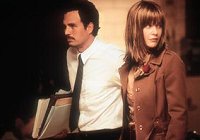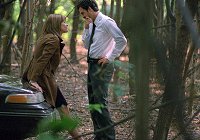 And this honest approach extends to sex scenes that are raw and often unpredictable. But Ryan dismisses any suggestion that filming these scenes was difficult. "I felt very taken care of," she says. "The sex scene is not the day you look forward to; I kept seeing it coming up on the schedule! But it was a very protective environment, choreographed and planned carefully. I don't really think about whatever idea about me is out there. And it's a lot harder to fake it in a deli, rather than a controlled environment with choreography."
And this honest approach extends to sex scenes that are raw and often unpredictable. But Ryan dismisses any suggestion that filming these scenes was difficult. "I felt very taken care of," she says. "The sex scene is not the day you look forward to; I kept seeing it coming up on the schedule! But it was a very protective environment, choreographed and planned carefully. I don't really think about whatever idea about me is out there. And it's a lot harder to fake it in a deli, rather than a controlled environment with choreography."The film is also fairly brutal, although Campion points out that there's not any actual on-screen violence. "I find that too difficult," she says. "Even the one stunt where Meg's character gets hit by the taxi, I was in torment because people could really get hurt! Fucking filmmaking! And when we did it the first time I forgot to say cut because I thought she was dead. But of course she was fine, just lying there waiting for me to say cut." When she's reminded that there is some violence in Ryan's character's dream sequences, Campion admits it, but says she filmed it in black and white Charlie Chaplin style to undermine it. On the buckets of blood splashed around the murder scenes she's much more unapologetic: "I didn't want to step away from all the blood, because as females we know about blood!"
Campion goes on to talk about he film's dreamlike visual imagery, echoing her organic approach to filmmaking. "I was just trying to get the story -- that's the container and then you can work on the atmosphere, references or feelings. It's like the effect of poetry -- you don't try to work out a poem because it's all over then! It's about what remains in you -- the rhyming, the images."
And part of this imagery was hair, as both of the lead actors had to alter their appearance for their characters. "I was hiding behind that moustache," Mark jokes. "Actually, we had a big discussion about it. I liked it because it's a cop thing. I liked having it. And I liked losing it."
At which point Campion gets defensive: "Having done research I discovered how many detectives have moustaches!" And she also had specific ideas for Ryan. "I had an image of someone with straight hair and bang and I was working on Meg's psyche when we saw the tshirt."
Ryan laughs. "It was organic," she says. "Jane and I were walking around the city and we saw this nihilistic cartoon character called Emily the Strange on a tshirt. I always thought she'd have brown eyes and brown hair. And everything contributes; I dyed my hair and I could walk around New York without being recognised! She really needed to be one of those invisible women, not a head turner."
These things not only contributed to the finished film. but made working on the set much more enjoyable. "Well you can imagine 12 hours on set a day with Jane," Mark says. "It's a lot of fun."
"But when I'm writing I don't feel happy," Campion laughs, obviously conjuring up unhappy memories. "The voices in my head say, 'You're a joke, you're full of shit!' So I have to try to do something about that."
Ryan also enjoyed working with Jennifer Jason Leigh, who plays her sister in the film. "We had a pretty instantaneous love for each other. We did a lot of things together."
This was another bit of manipulation from Campion, it seems. "You want them to feel trust and support for each other," she confesses. "Everything was set up so they'd be that way. And Kevin Bacon just decided to do this smaller part on the basis of him as an actor, not a movie star. He just thought it was a good part for him. And it was."
But Campion is most proud of the way the film examines romantic illusions. "The story gave me the opportunity to explore the situation of women today, dealing with independence and the models we grew up with, namely finding love in a relationship with a man. I wanted to see how that model falls short for us and causes a lot of grief. If we fail we feel unloved and incomplete. We don't discuss that but it does exist."
"And if it's unexpressed it's even more frustrating," Ryan adds. "It's heartbreaking if the romantic myths don't fit."



Ryan and Ruffalo: In the Cut


See also: SHADOWS'
IN THE CUT REVIEW

